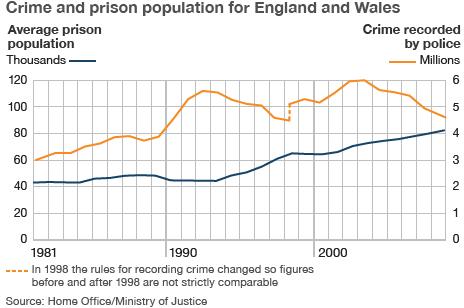What's the price of DVD players got to do with crime?
- Published

Problems with recording crime accurately can make it difficult to apply theories
Crime is the lowest it's been for almost 30 years across much of the UK, according to research published on Thursday. Is this down to the record prison population, growing prosperity or cut price DVD players. Everyone, it seems, has a theory.
For centuries, academics have been trying to figure out why people commit crime.
Early theories blamed the shape of someone's skull. Modern observations point to the effects of social background, climate or even legalised abortion. Only this week, Justice Secretary Ken Clarke dismissed the theory that crime is driven down by locking more people up in prison.
But according to Ian Marsh, author of Theories of Crime, all these efforts to understand what pushes crime up or down will never quite crack the question.
"You can't expect any examination to say why some people embezzle funds, others beat up their wives and others like a good punch-up on a Saturday night," he says.
A lecturer at Liverpool Hope University, Mr Marsh says certain patterns do merit attention. Criminologists emphasise people's home environment as a key factor, along with differences in upbringing.
But he warns: "People react differently. Some are brought up by 'bad parents' and turn to crime - others don't.
"It sounds sensible that people who don't get on at school or get good jobs might turn to crime but that doesn't explain why someone with a lot of money commits fraud."
Detection is also an issue. In a room full of people, many might admit to having committed petty theft, vandalism or drug use while growing up but never having been caught, he adds.
Prof Adam Crawford, director of Leeds University's Centre for Criminal Justice Studies, says inaccuracies in crime recording affect research, noting that courts deal with only 2% of all crime.
"Most offences don't get reported, responded to or cleared up," he says.
The British Crime Survey, external, published on Thursday, is conducted with a limited sample of the public. Officials consider it more accurate than police figures, which are only a record of reported crimes.

Have electronic goods become so cheap they are not worth stealing?
Application of the law can also distort the figures, says Prof Crawford.
Rules introduced by Labour allowed police to deal with public disorder through on-the-spot fines.
This improved clear-up rate, he says, but effectively created crime, where the behaviour - such as someone riding a bike on the pavement - might previously have been dealt with by a slap on the wrist.
Similarly, if police flood into estates with historically high rates of burglary or violent offences, their presence will allow them to detect yet more crime while drug possession in leafy suburbs goes unnoticed.
These difficulties - not to mention social differences - make comparison of crime rates between countries difficult.
While Britain and the US record similar data, few others are comparable, says Danny Dorling, professor of human geography in the University of Sheffield. Japan's crime rate, for instance, is about 10 times lower.
The only way to answer the questions about why crime falls, he says, would be to build a wall around each county in the UK, and then change the conditions to establish the influencing factors.
So, while politicians may suggest prosperity was the key to recent falling crime, others continue to put it down to improved home security or simply that items like electronic goods became so cheap they were no longer worth pinching.
Here, we examine a few notable theories:
Prison population
Mr Clarke's former Cabinet colleague Michael Howard insisted when he was home secretary that "prison works". Supporters of this view can point to the way crime has fallen in recent years while prison numbers have risen.

But Alana Barton of the Centre for Crime Studies says this is mythology. "There are a lot of reasons why we have a high prison population, and it's more to do with the politics of the day." We have the highest number of prisoners in Europe but we don't have the lowest crime rate, she says.
Prof Adam Crawford says research on the deterrent effect of prison was "limited and insubstantial". Other evidence suggested that incarcerating young men only made them more likely to reoffend, he adds.
Abortions
In 2001, a paper published in the US by two academics suggested a link between the legalisation of abortion in 1973 and a fall in crime about 18 years later. Co-author Steven Levitt, who four years later elaborated on this theory in the bestseller Freakonomics, argued that women who have abortions are those most likely to give birth to children who would later engage in criminal activity. But this theory has many critics. Mr Dorling dismisses it as ridiculous. "The birth rate is much more important than the abortion rate. Abortions are such a small part of that. In the 70s we had a declining birth rate due to contraception." This reduction in population was neatly plugged by immigration 30 years later, but crime still fell.
Price of DVD players
The resale value of electronic items has an impact on crime, says Mr Dorling, who thinks it is no coincidence that burglaries were high in the 1980s, when these goods were much more expensive. "That was partly due to the recession but also because goods were worth stealing. I can't believe there's a black market now. Would you buy a DVD player in the pub for £10 or go into Asda and buy one for £19?"
Welfare benefits
In the 1980s, absolute poverty was worse than it is now, so this pushed burglaries up, says Mr Dorling. Today, Jobseekers' Allowance of £9 per day is just enough for people to feed themselves, he says, but if it was cut then it could cause people to think about stealing. "It's all about the benefits level and it is most punitive to single young men without children, therefore we have almost created a benefit system which is close to encouraging them to commit crime."
- Published11 June 2011